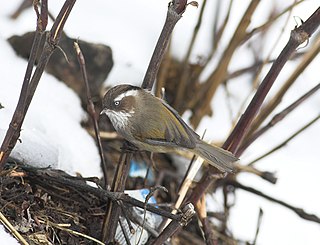
The ashy-throated parrotbill is a parrotbill. In old sources, it may be called Alphonse's crow-tit; though superficially resembling a tit it is not a member of the Paridae. The native range of this species extends from south-west China to northern Vietnam, and it might have become naturalised in one area in Italy.

The pin-striped tit-babbler, also known as the yellow-breasted babbler, is a species of bird in the Old World babbler family Timaliidae that is found in South and Southeast Asia.
The Escudo hummingbird is a hummingbird in the subfamily Trochilinae. It was long considered a doubtfully distinct species, but more recently it is generally treated as a subspecies of the rufous-tailed hummingbird, A. tzacatl.

The rufous-winged fulvetta is a bird species of the family Pellorneidae. Its common name is misleading, because it is not a close relative of the "typical" fulvettas, which are now in the genus Fulvetta.

The yellow-throated fulvetta is a species of bird in the family Pellorneidae. Its common name is misleading, because it is not a close relative of the "typical" fulvettas, which are now in the family Paradoxornithidae.

The grey-hooded fulvetta is a bird species in the family Paradoxornithidae. Like the other typical fulvettas, it was long included in the Timaliidae genus Alcippe or in the Sylviidae.

The brown-throated fulvetta or Ludlow's fulvetta is a species of bird in the family Paradoxornithidae. Like the other typical fulvettas, it was long included in the Timaliidae genus Alcippe or in the Sylviidae. It is found in Bhutan, China, India, Myanmar, and Nepal.

The spectacled fulvetta is a bird species in the family Paradoxornithidae. Like the other typical fulvettas, it was long included in the Timaliidae genus Alcippe or in the Sylviidae.
The Chinese fulvetta is a bird species in the family Paradoxornithidae. Like the other typical fulvettas, it was long included in the Timaliidae genus Alcippe or in the Sylviidae.

The white-browed fulvetta is a bird species in the family Paradoxornithidae. Like the other typical fulvettas, it was long included in the Timaliidae genus Alcippe or in the Sylviidae.

The Naga wren-babbler or long-tailed wren-babbler is a bird species in the family Timaliidae. In India it is found in Nagaland and Manipur.

Fulvetta is a genus of passerine birds. Originally proposed in 1877, it was recently reestablished for the typical fulvettas, which were long included with their presumed relatives in the Timaliidae genus Alcippe. But they are actually quite closely related to the parrotbills, and are thus now placed in the family Paradoxornithidae.

The Chin Hills wren-babbler is a bird species in the family Timaliidae. It was until recently considered a subspecies of the long-tailed wren-babbler; the IUCN for example started recognizing it as distinct species in 2008.
The grey-bellied wren-babbler is a bird species in the family Timaliidae. It was until recently considered a subspecies of the long-tailed wren-babbler; the IUCN, for example, started recognizing it as distinct species in 2008.
The pale-throated wren-babbler is a bird species in the family Timaliidae. It was until recently considered a subspecies of the long-tailed wren-babbler; the IUCN for example started recognizing it as distinct species in 2008. It is endemic to Vietnam

The Himalayan cutia is a bird species in the family Leiothrichidae. Its scientific name ultimately means "the khutya from Nepal", as Cutia is derived from the Nepali name for these birds, and nipalensis is Latin for "from Nepal".
The Vietnamese cutia is a bird species in the family Leiothrichidae. It is found in Laos and Vietnam.

The Taiwan fulvetta is a bird species in the family Sylviidae. Like the other typical fulvettas, it was long included in the Timaliidae genus Alcippe. In addition, it was long included in F. cinereiceps as a subspecies.
The Indochinese fulvetta is a bird species in the family Paradoxornithidae. Like the other typical fulvettas, it was long included in the Timaliidae genus Alcippe or in the Sylviidae. It was previously considered a subspecies of the spectacled fulvetta, F. ruficapilla.

The jungle babblers are a family, Pellorneidae, of mostly Old World passerine birds belonging to the superfamily Sylvioidea. They are quite diverse in size and coloration, and usually characterised by soft, fluffy plumage and a tail on average the length of their body, or longer. These birds are found in tropical zones, with the greatest biodiversity in Southeast Asia and the Indian subcontinent.















